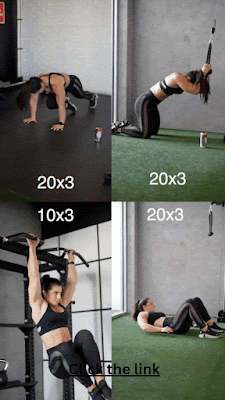A 30-minute full-body HIIT (High-Intensity Interval Training) workout is a fantastic way to burn calories, improve cardiovascular fitness, and build strength with minimal equipment needed. This workout consists of three 10-minute circuits, each containing four exercises. Perform each exercise for 45 seconds, followed by a 15-second rest before moving on to the next one. After completing all four exercises, rest for 1 minute before starting the next circuit. Let's dive in!
Warm-Up (5 minutes)
Start with a 5-minute warm-up to get your blood flowing and muscles ready. Include dynamic stretches and light cardio movements such as:
- Jogging in place
- Arm circles
- Leg swings
- Jumping jacks
Circuit 1: Lower Body & Core
- Squat Jumps: Start in a squat position, then explosively jump up, reaching your arms overhead. Land softly and go back into a squat.
- Mountain Climbers: In a plank position, alternate bringing your knees towards your chest as fast as you can, keeping your core tight.
- Lunges: Alternate lunging forward with each leg, keeping your upper body straight and core engaged.
- Plank with Shoulder Taps: In a plank position, tap your left shoulder with your right hand and vice versa, keeping your hips as stable as possible.
Rest for 1 minute.
Circuit 2: Upper Body & Core
- Push-Ups: Perform a traditional push-up, keeping your body in a straight line from head to heels. Modify by dropping to your knees if needed.
- Tricep Dips: Using a chair or bench, position your hands shoulder-width apart and dip down, bending your elbows to 90 degrees before pushing back up.
- Russian Twists: Sit on the ground with knees bent, lean back slightly, and twist your torso side to side, touching the ground next to you with your hands or a weight.
- Supermans: Lie face down, extend your arms in front of you, then lift your arms, chest, and legs off the ground, engaging your back and glutes.
Rest for 1 minute.
Circuit 3: Cardio & Agility
- Burpees: From a standing position, squat down, place your hands on the floor, jump back into a plank, do a push-up, jump your feet back to your hands, and leap up explosively.
- High Knees: Run in place, bringing your knees up as high as possible and pumping your arms.
- Skaters: Leap side to side, landing on one foot while swinging the other behind you, mimicking a speed skater's movement.
- Plank Jacks: In a plank position, jump your feet in and out like a jumping jack, keeping your core engaged and back flat.
Cool Down (5 minutes)
End your session with a 5-minute cool-down consisting of gentle stretching focusing on major muscle groups. Include stretches such as:
- Hamstring stretch
- Quad stretch
- Shoulder stretch
- Tricep stretch
- Child's pose
This 30-minute HIIT workout will challenge your entire body, boost your metabolism, and improve your overall fitness. Remember to hydrate, modify exercises as needed, and listen to your body throughout the workout.
.gif)

.gif)
